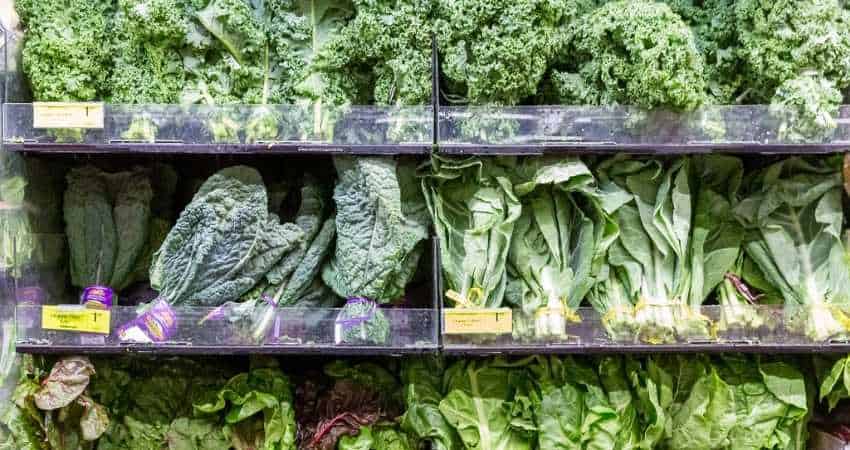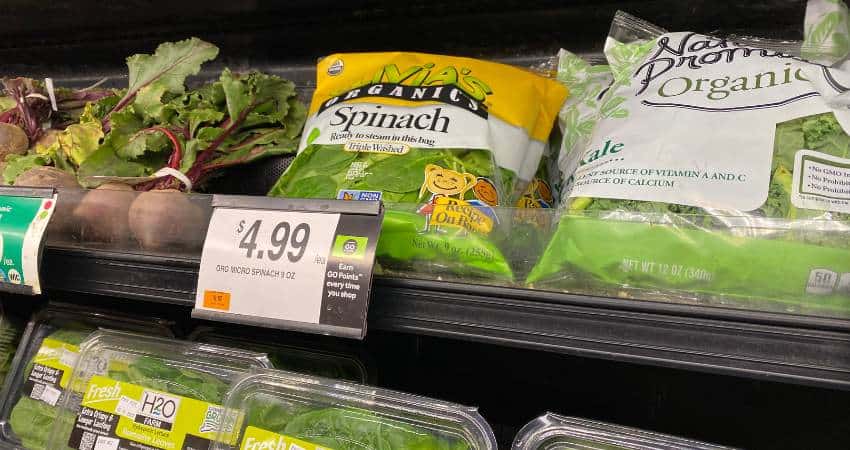Organic Kale vs. Regular Kale: What’s the Difference?
While discussing regular kale and organic kale, you may be asking yourself, what’s the difference between organic kale and regular kale?
Organic kale and regular kale are different because organic kale has less pesticide residue. Regular kale placed third on the Environmental Work Group’s “Dirty Dozen” list because of its high pesticide levels. Organic and regular kale also differ because organic kale is more costly.
This article will go over what kale is, the many types of kale, the health benefits it provides, its health risks, and the differences between organic and regular kale.
What’s the Difference Between Organic and Conventional Kale?

As a Certified Health Coach many clients ask me about food comparisons including kale. Also, I purchase and consume it every week. Therefore, I have researched this topic in the past and present. Let’s examine both types closely.
Organic kale is safer than conventional kale because it contains fewer pesticides. As a result, it may be better for vulnerable individuals, such as children and pregnant women, to eat organic kale. Is it the same with organic spinach? Find out by reading my blog post next, Organic Spinach vs. Regular Spinach: What’s the Difference?
Conventional Kale Is Included on the “Dirty Dozen” List
Each year the Environmental Working Groups (EWG) creates a “dirty dozen” list, which analyzes various fruits and vegetables to determine which ones have the most pesticide residue. In 2019 and 2020 kale made third, only beat by strawberries and spinach1.
The EWG discovered that 92% of the kale samples they tested had two or more types of pesticide residue. Some samples had 18 different types of pesticides still on them2.
The most common substance found on kale was Dacthal, otherwise known as DCPA3.
DCPA is the active ingredient in many herbicides responsible for controlling the growth of weeds and plants.
The Environmental Protection Agency (EPA) has classified it as a possible carcinogen to humans based on studies done on rats. During the studies, they found that rats who were administered DCPA were more likely to develop liver and thyroid tumors than rats who did not receive DCPA4.
Even though kale has more pesticide residue on it than other produce, many experts argue that the amount is still not large enough to negatively impact someone’s health. So, while regular kale contains more pesticides, it is still up to debate whether these amounts are harmful to humans.
Organic Kale Is Safer for Vulnerable Populations
According to the Center for Ecogenetics and Environmental Health, fetuses, babies, young children, pregnant women, nursing mothers, and women who are of childbearing age may be more susceptible to the adverse effects of pesticides5.
Children eat more relative to their body weight compared to adults, so they are more at risk. Similarly, fetuses and infants can receive pesticides from their mothers, which may negatively impact their health.
People might be more vulnerable to the effects of pesticides during times of extensive growth, such as fetal development, infancy, early childhood, and puberty5.
Multiple studies have shown that when children eat an organic diet, they are exposed to fewer pesticides than when they eat conventional diets. In fact, organic produce has been found to have 30% lower pesticide residues than conventional fruits and vegetables6.
So, if you want your loved ones to consume fewer pesticides, organic kale may be the way to go.
Organic Kale Is More Expensive
While organic kale has fewer pesticides, it also costs more7. On average, organic produce is 10-40% more expensive than conventional produce since it is more costly to grow produce organically without the use of traditional pesticides and conventional farming techniques.

Does Organic Kale Contain More Nutrients?
In short, the answer is no.
Researchers from Stanford University reviewed approximately 237 studies that compared the nutrient content of organic and conventional foods. They discovered that, in general, organic foods and conventional foods are pretty similar health-wise8.
The differences they found were higher phosphorus levels in a number of organic foods and greater amounts of omega-3 fatty acids in organic milk and chicken.
So, according to these studies, organic kale will not provide you with more nutrients than conventional kale.
Should I Buy Organic Kale?
Because kale is on the “dirty dozen” list, it may be safer for you to buy organic kale. While pesticides are potentially bad for everyone, they may be especially harmful to infants, children, adolescents, and pregnant and nursing mothers. So if you or any of your family members fall into any of these groups, you might want to consider buying organic.
Although the negative effects of pesticides such as DCPA are still under investigation, studies have identified that they have harmful effects which could also negatively impact you and your loved ones9
Kale is not the only food you should consider buying organic. Other fruits and vegetables on the EWG’s 2020 Dirty Dozen list include:
- Pears
- Peaches
- Apples
- Grapes
- Kale
- Nectarines
- Spinach
- Cherries
- Celery
- Hot Peppers
- Strawberries
- Potatoes
- Tomatoes
The EWG also has another list called the “Clean 15.” This list consists of 15 fruits and vegetables that have less pesticide residue, so you may not need to buy organic10. These include:
- Sweet Corn
- Avocados
- Onions
- Pineapple
- Asparagus
- Sweet peas (frozen)
- Eggplant
- Papaya
- Cauliflower
- Cabbage
- Broccoli
- Kiwi
- Cantaloupe
- Honeydew melon
- Mushrooms
So, if you choose to buy organic produce, it may be a good idea to start with items on the Dirty Dozen list. Organic produce has been proven to have less pesticide residue than regular produce, making them an ideal choice if you are concerned about the potentially negative health effects.
If you have any questions to ask me about this article don’t hesitate to comment below or email us. You can find an email on our contact page.
Read Next – More Food vs Food!
What is Kale? Types, Nutrients and Benefits
This is How Much Kale You Should Eat Per Day
Farm-Raised Vs Wild-Caught Scallops: Which Seafood is Best?
Organic Carrots vs. Regular Carrots: What’s the Difference?
Organic Mango vs. Conventional Mango: Which is Better?
- EWG: Dirty Dozen EWG’s 2020 Shopper’s Guide to Pesticides in Produce [↩]
- EWG: Kale Vaults Up the Dirty Dozen List, California Takes on Chemicals in Cosmetics and More [↩]
- Delaware Health and Social Services: DACTHAL [↩]
- EPA: Health Effects Support Document for Dacthal Degradates: Tetrachloroterephthalic Acid (TPA) and Monomethyl Tetrachloroterephthalic Acid (MTP) [↩]
- Center for Ecogenetics & Environmental Health: Health Risks of Pesticides in Food [↩] [↩]
- Harvard Health: Organic food no more nutritious than conventionally grown food [↩]
- Food and Agriculture Organization of the United Nations: Why is organic food more expensive than conventional food? [↩]
- Stanford Medicine: Little evidence of health benefits from organic foods, study finds [↩]
- Office of Environmental Health Hazard Assessment: DCPA, MTP and TPA in Groundwater [↩]
- EWG: Clean Fifteen: EWG’s 2020 Shopper’s Guide to Pesticides in Produce [↩]
